Disputes unfolded at the National Toshaos Council Conference (NTCC) on Monday and yesterday, leading to accusations of unlawful conduct and eviction from the Arthur Chung Conference Centre of Member of Parliament and Leader of the Guyana Action Party (GAP) Vincent Henry, and Central Executive Committee member of the PNCR Mervyn Williams.
Speaking with Stabroek News yesterday Williams said, “I was not even allowed in. I will write a press release on my experience. But what I will say is that with all I have read about North Korea, I strongly believe that what we in Guyana are rapidly accepting as the norm, is taking us down the road of living in a dictatorship like North Korea. We have people here who are ruling with an iron fist and screaming ‘this is democracy’.”
Henry, who is also a member of the Parliament Sectoral Committee on Natural Resources, said he was forcibly removed from the conference despite his claims of rightful attendance as an Indigenous leader. According to Henry, he had registered, received a badge, and was seated among other attendees. However, he was later approached by a staff member and subsequently a police officer, who alleged that he was impersonating someone and instructed him to leave.
Henry asserted his entitlement to attend based on the Amerindian Act of 2006, which mandates that all Amerindians are welcome at National Toshaos Council events. He maintained that his removal was unjustified and contrary to his rights under the Act. The altercation, a recording of which was seen by this newspaper, featured Henry being repeatedly told to leave despite presenting his parliamentary identification, and being called an “imposter”. A police officer, identified as H Hamer justified the eviction by stating that MPs were not allowed at the meeting, which he claimed was exclusively for toshaos—village leaders.
Henry described his eviction as a violation of his rights as he emphasised his role in representing hinterland communities, where mining activities and Indigenous concerns converge.
“I am Indigenous! As a parliamentarian and leader of the Guyana Action Party, it is my duty to represent the hinterland communities, where mining impacts both people and resources,” Henry asserted. “The Amerindian Act of 2006 allows all Amerindians to be part of the National Toshaos Council. Even though not everyone can attend due to space constraints, I felt it was essential for me to be present, listen, and ensure proper representation.”
He expressed disappointment that not all members of the sectoral committee were invited to the NTCC, a point he believes should have been addressed.
Henry recounted that, during a speech by Natural Resources Minister Vickram Bharrat, he was approached by someone claiming that another MP wanted to discuss an urgent matter. After reaching out to the MP and receiving no response, Henry remained seated. Shortly thereafter, he was informed by a staff member that he was an imposter and needed to leave. When Henry presented his MP card, the staff member refused to acknowledge it and soon returned with a police officer, who reiterated the order to vacate the premises.
As he was escorted out, Henry said, he addressed the toshaos in Arawak, articulating his right to be present and his reasons for attending before departing the event peacefully.
In the recording, a man’s voice could be heard repeatedly instructing Henry “please leave,” despite his attempts to assert his position as an Indigenous Member of Parliament by presenting his ID card. The voice persists, “You have to leave, you are impersonating somebody.”
Another voice, identified as Officer H Hamer, intervenes, asserting, “Members of Parliament are not allowed to this meeting. My understanding is that this event is mainly for the toshaos who are the village

leaders.” Henry responds that it is a “breach of the constitution,” citing the Amerindian Act’s provision that all Indigenous people are welcome at such functions. Henry asks whether Hamer was saying that he, as an Indigenous person, was not allowed at the meeting. Hamer counters, “I never said that”.
Meanwhile, the APNU has condemned the incident as “vile and illegal”, arguing that the conference was meant for all Indigenous people. In a statement, it accused the PPP of suppressing dissent and violating constitutional rights. The APNU’s statement emphasised that such actions further erode support among Indigenous communities, who are increasingly disillusioned with the ruling party.
In a counter-statement issued by the Ministry of Amerindian Affairs yesterday, Minister Pauline Sukhai dismissed the opposition’s claims as a desperate attempt to undermine the PPP’s favourable standing with the Amerindian population. Sukhai characterised the APNU’s reaction as a fabricated narrative intended to distract from the government’s achievements and ongoing support among hinterland communities.
Sukhai emphasised the conference’s role in facilitating direct, intensive engagement between Indigenous leaders and government representatives. She highlighted the government’s commitment to hinterland development through various programs and past initiatives, arguing that the APNU’s criticism was an attempt to deflect from their own historical neglect of these communities during their time in office.
The minister’s statement reaffirmed the government’s dedication to sustainable development and its readiness to address the needs and requests of Amerindian communities, contrasting sharply with the APNU’s portrayal of the situation.








